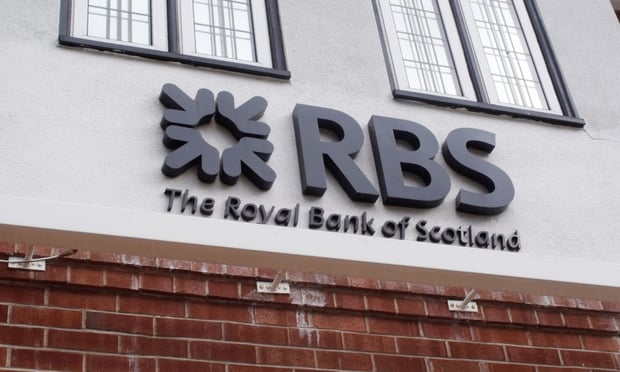Royal Bank of Scotland: $4.9B Lesson for General Counsel on Misconduct, Dumb Emails
According to the massive DOJ settlement, RBS didn't just commit fraud—its employees also chatted about it via email and text.
August 15, 2018 at 05:23 PM
4 minute read
 (Photo: Elliott Brown)
(Photo: Elliott Brown)
Leading up to the 2008 global financial crisis, executives in The Royal Bank of Scotland Group made a number of risky moves and failed to disclose them to investors, including U.S. mortgage lenders Fannie Mae and Freddie Mac. The moves resulted in $49 billion in investor losses, according to the U.S. Department of Justice.
On Tuesday, DOJ announced a $4.9 billion settlement with London-based RBS—the largest U.S. penalty imposed by the agency for financial crisis-related misconduct at a single entity. (In 2017 Deutsche Bank agreed to pay a $3.1 billion penalty; plus a separate $4.1 billion in relief to underwater homeowners and affected communities.)
The RBS settlement stands as a lesson for general counsel in how not to let a company behave, including discussing the misconduct in emails and texts.
The settlement document and its statement of facts suggest the record penalty was imposed due to the size of the fraud and the egregiousness of the misconduct, according to two legal sources who have been deeply involved in pursuing similar bank behavior. They declined to be identified because they were not authorized by their employers to speak on the record.
A third source, law professor G. Marcus Cole of Stanford University, said, “The settlement targets what the DOJ and regulators view as both fraudulent behavior as well as irresponsible behavior and practices.”
Cole specifically pointed to an RBS practice of “capping” the number of bad mortgages that it would reject or kick out from loan initiators and lenders, allowing bad mortgages into the pool of securities. “To make matters worse,” Cole said, “they failed to disclose these kick-out caps, as well as the loan origination errors that RBS discovered and accepted because of these caps.”
A statement from Andrew E. Lelling, U.S. attorney for the District of Massachusetts, said, “This resolution—the largest of its kind—holds RBS accountable for defrauding the people and institutions that form the backbone of our investing community. Despite assurances by RBS to its investors, RBS's deals were backed by mortgage loans with a high risk of default.”
Lelling signed the settlement, along with Chad Readler, acting assistant attorney general for DOJ's Civil Division; and Michael Shaw, chief legal officer and general counsel for RBS.
The bank did not admit any wrongdoing and “disputes the contentions” made by the federal government in the statement of facts.
However as part of a previous settlement in March with the New York State Attorney General's office, “RBS admit[ted] that it sold investors [residential mortgage-backed securities] backed by mortgage loans that, contrary to its representations, did not materially comply with underwriting guidelines.”
After Tuesday's settlement, Ross McEwan, RBS chief executive, said the bank is interested in moving on.
“We are pleased to have reached a final settlement with the DOJ and that we can focus our energy on serving our customers better and returning capital to our shareholders,” he said in a statement.
While McEwan still did not admit misconduct, he continued, “This settlement dates back to the period between 2005 and 2007. There is no place for the sort of unacceptable behavior alleged by the DOJ at the bank we are building today.”
The statement of facts contains details using contemporaneous calls and emails of RBS executives, showing how the bank “routinely made misrepresentations to investors about significant risks” and then discussed the misconduct among themselves, the DOJ said.
Among the statements cited:
- One RBS chief credit officer in the United States labeled them “total f***ing garbage” loans with “fraud [that] was so rampant … [and] all random,” so “the loans are all disguised to, you know, look okay kind of … in a data file.”
- A senior vice president in RBS's asset-backed finance department explained to one of his colleagues that the loans were the product of a broken mortgage industry: The mortgage lenders “raking in the money” had an “incentive … to bring in as many loans as possible,” while “the [mortgage lenders' employees] that … have the incentive to hold the line don't give a sh** because they're not getting paid.”
- A senior RBS trader noted in a May 2006 self-evaluation that, when compared to “the rest of [Wall S]treet, … we do the least amount of diligence and kick out the fewest loans.” On occasion, RBS did not conduct any due diligence at all.
This content has been archived. It is available through our partners, LexisNexis® and Bloomberg Law.
To view this content, please continue to their sites.
Not a Lexis Subscriber?
Subscribe Now
Not a Bloomberg Law Subscriber?
Subscribe Now
NOT FOR REPRINT
© 2025 ALM Global, LLC, All Rights Reserved. Request academic re-use from www.copyright.com. All other uses, submit a request to [email protected]. For more information visit Asset & Logo Licensing.
You Might Like
View All
Advance Auto Parts Hires GC Who Climbed From Bottom to Top of Lowe's Legal Department
2 minute read
Compliance With EU AI Act Lags Behind as First Provisions Take Effect

State AG Hammers Homebuilder That Put $2,000-Per-Day Non-Disparagement Penalty in Buyer Contracts
3 minute read
NBA Players Association Finds Its New GC in Warriors Front Office
Trending Stories
- 1ACC CLO Survey Waves Warning Flags for Boards
- 2States Accuse Trump of Thwarting Court's Funding Restoration Order
- 3Microsoft Becomes Latest Tech Company to Face Claims of Stealing Marketing Commissions From Influencers
- 4Coral Gables Attorney Busted for Stalking Lawyer
- 5Trump's DOJ Delays Releasing Jan. 6 FBI Agents List Under Consent Order
Who Got The Work
J. Brugh Lower of Gibbons has entered an appearance for industrial equipment supplier Devco Corporation in a pending trademark infringement lawsuit. The suit, accusing the defendant of selling knock-off Graco products, was filed Dec. 18 in New Jersey District Court by Rivkin Radler on behalf of Graco Inc. and Graco Minnesota. The case, assigned to U.S. District Judge Zahid N. Quraishi, is 3:24-cv-11294, Graco Inc. et al v. Devco Corporation.
Who Got The Work
Rebecca Maller-Stein and Kent A. Yalowitz of Arnold & Porter Kaye Scholer have entered their appearances for Hanaco Venture Capital and its executives, Lior Prosor and David Frankel, in a pending securities lawsuit. The action, filed on Dec. 24 in New York Southern District Court by Zell, Aron & Co. on behalf of Goldeneye Advisors, accuses the defendants of negligently and fraudulently managing the plaintiff's $1 million investment. The case, assigned to U.S. District Judge Vernon S. Broderick, is 1:24-cv-09918, Goldeneye Advisors, LLC v. Hanaco Venture Capital, Ltd. et al.
Who Got The Work
Attorneys from A&O Shearman has stepped in as defense counsel for Toronto-Dominion Bank and other defendants in a pending securities class action. The suit, filed Dec. 11 in New York Southern District Court by Bleichmar Fonti & Auld, accuses the defendants of concealing the bank's 'pervasive' deficiencies in regards to its compliance with the Bank Secrecy Act and the quality of its anti-money laundering controls. The case, assigned to U.S. District Judge Arun Subramanian, is 1:24-cv-09445, Gonzalez v. The Toronto-Dominion Bank et al.
Who Got The Work
Crown Castle International, a Pennsylvania company providing shared communications infrastructure, has turned to Luke D. Wolf of Gordon Rees Scully Mansukhani to fend off a pending breach-of-contract lawsuit. The court action, filed Nov. 25 in Michigan Eastern District Court by Hooper Hathaway PC on behalf of The Town Residences LLC, accuses Crown Castle of failing to transfer approximately $30,000 in utility payments from T-Mobile in breach of a roof-top lease and assignment agreement. The case, assigned to U.S. District Judge Susan K. Declercq, is 2:24-cv-13131, The Town Residences LLC v. T-Mobile US, Inc. et al.
Who Got The Work
Wilfred P. Coronato and Daniel M. Schwartz of McCarter & English have stepped in as defense counsel to Electrolux Home Products Inc. in a pending product liability lawsuit. The court action, filed Nov. 26 in New York Eastern District Court by Poulos Lopiccolo PC and Nagel Rice LLP on behalf of David Stern, alleges that the defendant's refrigerators’ drawers and shelving repeatedly break and fall apart within months after purchase. The case, assigned to U.S. District Judge Joan M. Azrack, is 2:24-cv-08204, Stern v. Electrolux Home Products, Inc.
Featured Firms
Law Offices of Gary Martin Hays & Associates, P.C.
(470) 294-1674
Law Offices of Mark E. Salomone
(857) 444-6468
Smith & Hassler
(713) 739-1250






